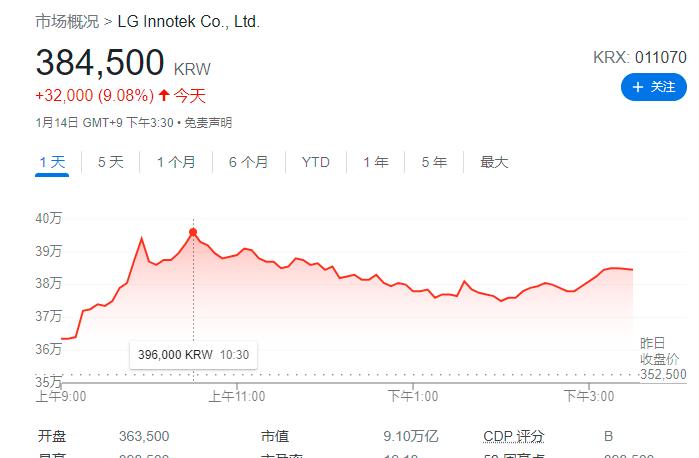According to Korean media Korea IT News, LG Innotek, a subsidiary of LG Group, is seeking to reach a supply agreement with Tesla on cameras and parts, a deal worth as much as one trillion won (about 5.347 billion yuan), and the contract will be concluded in the first quarter, and LG Innotek will immediately put into production. At that time, the Tesla Model Y, Model 3, electric truck Semi and the upcoming Cyberruck in the North American and European markets will be equipped with cameras produced by LG Innotek.
This news directly lifted the stock price of LG Innotek, which rose nearly 13% at one point in the intraday today (14th) and closed up 9%.

In response to the rumors, LG Innotek said, "We are unable to disclose matters related to customer supply. Many people in the industry still hold a wait-and-see attitude, IBK securities analyst Kim Un-ho said that the authenticity of the contract is still unclear, the amount has yet to be determined, "(contract amount) 1 trillion won may have to be apportioned to 5 years, not a year's order." ”
However, even on a five-year contract, LG Innotek earns 200 billion won (about 1.069 billion yuan) a year.
Tesla has always adopted a combination of multi-eye camera + millimeter wave radar + FSD chip. Just last July, Tesla signed a 490 billion won (about 2.6 billion yuan) camera module contract with Samsung Electric, which will supply Tesla Cyberterrock.
Tesla delivered about 936,200 vehicles in 2021, and Morgan Stanley analyst Adam Jonas said tesla production is expected to double to 2 million units in 2022, given Tesla's strong growth trend in the fourth quarter and the commissioning of new factories in Austin and Berlin. It is foreseeable that the increase in Tesla shipments will bring more orders to its camera suppliers.
At present, Tesla's car lens/camera module suppliers mainly include Lianchuang Electronics, OFILM, Sunny Optics, Weier Shares, LG, Samsung Motor, etc.
Strong certainty of camera growth Domestic enterprises have global competitiveness
Looking at the entire intelligent driving track, the clamor for lidar to get on the car is high, which does not hinder the development of the camera route. Although the "lidar solution" is dominated by lidar, it also needs to be equipped with cameras, millimeter-wave radar and other components. In order to complement the advantages and disadvantages of different sensors and improve the guarantee of system security, in recent years, the camera + radar fusion route has gradually become the mainstream perception configuration of ADAS. Intel's self-driving subsidiary Mobileye has said that in the level of high-level automatic driving, the pure visual perception based on the camera and radar + lidar fusion perception should be parallel, which is the real hardware redundancy.
Wang Fang, an analyst at Minsheng Securities, previously said that among the four tracks of the perception layer (camera, lidar, millimeter wave radar, and ultrasonic radar), the camera growth is the most certain, and the pattern of the lens and CMOS industry chain is good, and China has globally competitive enterprises Weier Shares, Shunyu Optics, and Lianchuang Electronics.
Fan Zhiyuan, an analyst at Guojin Securities, also expressed optimism about the field of car cameras, which said that thanks to the improvement of lack of cores and intelligent acceleration, it is expected that the car camera market will increase by 44% in 2022. It is expected that the automotive lens market will reach 26 billion yuan in 2025, the automotive camera market will reach 78.2 billion, and the CAGR will reach 32% from 2020 to 2025. In addition, at present, the car camera module is mainly dominated by overseas Tier1 and Tier2, with the rise of new car manufacturing forces and the upgrading of module specifications, the future car lens factory is expected to cut into the module market.